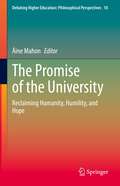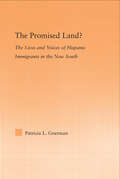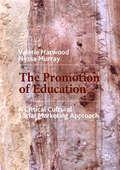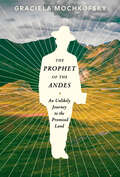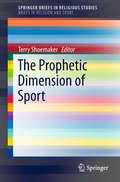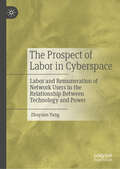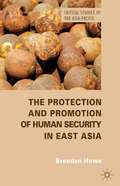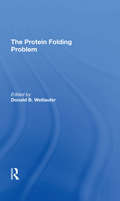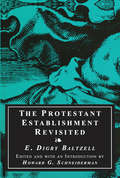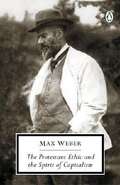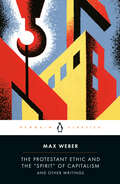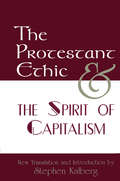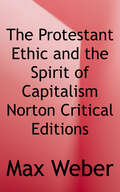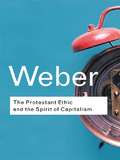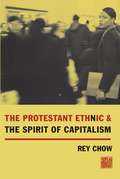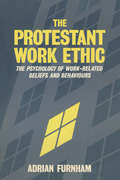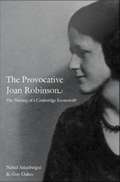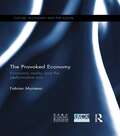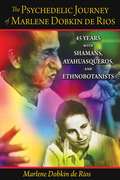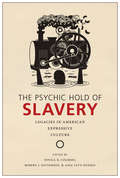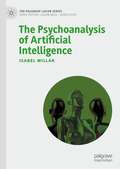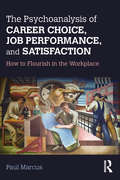- Table View
- List View
The Promise of the University: Reclaiming Humanity, Humility, and Hope (Debating Higher Education: Philosophical Perspectives #10)
by Áine MahonThis book offers philosophical readings of the contemporary university and is motivated by a series of pressing challenges in the global context of Higher Education. It argues that the university is a place for community, for refuge, for enlightenment and the careful questioning of knowledge, but it is also a place for visceral ambition and for intellectual cowardice, for blinkered individualism and professional competitiveness. In the context of a highly competitive post-crash global economy, contemporary students are placed under increasing pressure to distinguish themselves from their peers via a portfolio of learning excellence and extracurricular achievement. Growing numbers undertake part or full-time employment in order to cover registration fees and the basic costs of living. University staff take on very different forms of pressure that operate across the life-course of an academic career – from early-career anxieties to the worries of more privileged and permanent faculty who fear they do not meet ever-changing structures, assumptions and demands of the university itself. This book argues that these interlinked agendas demand consideration from philosophers of education in Ireland, Europe and further afield. It proposes that we must embody a very careful balancing act: one where we remember the romantic ideals and promises of the university while still acknowledging the very real and pressing challenges faced by our staff and students. The book will be of interest to academics, graduate students, and advanced-level undergraduates in Philosophy, Education, Mental Health, and Organizational Psychology in both North America and Europe.
The Promised Land
by Boulou De B'Beri Handel K. Wright Nina Reid-MaroneyEschewing the often romanticized Underground Railroad narrative that portrays southern Ontario as the welcoming destination of Blacks fleeing from slavery, The Promised Land reveals the Chatham-Kent area as a crucial settlement site for an early Black presence in Canada. The contributors present the everyday lives and professional activities of individuals and families in these communities and highlight early cross-border activism to end slavery in the United States and to promote civil rights in the United States and Canada. Essays also reflect on the frequent intermingling of local Black, White, and First Nations people. Using a cultural studies framework for their collective investigations, the authors trace physical and intellectual trajectories of Blackness that have radiated from southern Ontario to other parts of Canada, the United States, the Caribbean, and Africa. The result is a collection that represents the presence and diffusion of Blackness and inventively challenges the grand narrative of history.
The Promised Land?: The Lives and Voices of Hispanic Immigrants in the New South (Latino Communities: Emerging Voices - Political, Social, Cultural and Legal Issues)
by Patricia L. GoermanThrough analysis of in-depth interviews with seventy-three Hispanic immigrants in Central Virginia, this book offers a rare in-depth look at the views and circumstances of immigrants in a new receiving area. It provides an examination of the new migration trend including an analysis of immigrants' living and working conditions, their family life, and their plans for the future.
The Promotion of Education: A Critical Cultural Social Marketing Approach
by Valerie Harwood Nyssa MurrayThis book introduces critical cultural social marketing and adapts these techniques for use in the promotion of educational futures in communities and places where there is educational disadvantage. An approach that builds on the discipline of social marketing, the authors describe the promotion of education as underpinned by a commitment to understanding the effects of difficult experiences with institutions such as schools, as well as the diversity of learning. Involving the critical in promoting education means it is possible to be alert to the impacts of institutional education, while involving the cultural means we are forced to appreciate and connect with learning in all its diversity. The authors draw upon examples from Lead My Learning, an education promotion campaign produced using a critical cultural social marketing approach. In doing so, they provide a detailed account of new ways to promote education.
The Prophet of the Andes: An Unlikely Journey to the Promised Land
by Graciela MochkofskyThe remarkable true story of how one Peruvian carpenter led hundreds of Christians to Judaism, sparking a pilgrimage from the Andes to Israel and inspiring a wave of emerging Latin American Jewish communities &“If Gabriel García Márquez had written the Old Testament, it might read like Graciela Mochkofsky's staggering true account of a humble Peruvian carpenter's spiritual odyssey from a shack in the Andes, via the Amazon, to the Promised Land of Israel with a community of devoted followers." —Judith Thurman, award-winning author of Isak DinesenSegundo Villanueva was born in 1927 in a tiny farming village perched in the Andes; when he was seventeen, his father was murdered and Segundo was left with little more than a Bible as his inheritance. This Bible launched Segundo on a lifelong obsession to find the true message of God contained in its pages. He found himself looking for answers outside the Catholic Church, whose hierarchy and colonial roots embodied the gaping social and racial inequities of Peruvian society. Over years of religious study, Segundo explored various Protestant sects and founded his own religious community in the Amazon jungle before discovering a version of Judaism he pieced together independently from his readings of the Old Testament. His makeshift synagogue began to draw in crowds of fervent believers, seeking a faith that truly served their needs. Then, in a series of extraordinary events, politically motivated Israeli rabbis converted the community to Orthodox Judaism and resettled them on the West Bank. Segundo&’s incredible journey made him an unlikely pioneer for a new kind of Jewish faith, one that is now attracting masses of impoverished people across Latin America. Through detailed reporting and a deep understanding of religious and cultural history, Graciela Mochkofsky documents this unprecedented and momentous chapter in the history of modern religion. This is a moving and fascinating story of faith and the search for dignity and meaning.
The Prophetic Dimension of Sport (SpringerBriefs in Religious Studies)
by Terry ShoemakerBringing together leading scholars in the fields of Religion and Sport, this book examines the prophetic dimension of sport, to arrive at a better understanding of the nature of sports in the United States. By detailing and analyzing particular sports, a portrait of sport as an important space for social and political critique emerges. Sport is indisputably an important cultural phenomenon in the United States. Each year millions attend sporting events, track the statistics and lives of sports stars, collect memorabilia, engage in fantasy sports, and play various sporting games. But increasingly, sport is also a space for public articulations regarding social and political issues within the United States. What are we to make of these particular articulations? What do they tell us about the nature of sport in the United States? How are these social and political critiques formed? Why do sporting voices seem to carry more weight at this moment in history? Ideally suited for use in undergraduate and graduate courses, this book offers a new way of thinking about the connection between sport and religion in a secularizing society. By analyzing various sports and particular historical moments, the chapters supply a unique example of the relevance of sport as it pertains to social and political critique.
The Prospect of Labor in Cyberspace: Labor and Remuneration of Network Users in the Relationship Between Technology and Power
by Zhuyuan YangThis book explores user labor in the internet age, offering innovative perspectives on digital labor. It broadens the discussion on topics like technology and power, the reproduction of network user labor, labor relations in cyberspace, economic rewards of network user labor, and especially the non-economic rewards of network user labor. Specifically, the book examines the impact of technology, power, and capital on network user labor, the control exerted by media platforms over this labor, and the payment methods for both economic and non-economic rewards.
The Protection and Promotion of Human Security in East Asia
by Brendan HoweAlthough many of the states of East Asia have achieved startling success, not all have benefited from the region's development. Many of the most vulnerable sections of East Asian populations still face tremendous challenges in their daily lives, have yet to enjoy the rewards of the Asian Century, and may even be further imperiled as a result of the forces of development. Brendan Howe examines the measurements of success in East Asian development and governance from a human-centered perspective. He assesses obstacles to the protection and promotion of human security and development through detailed case studies of the most challenged states in the region, including Burma, Timor-Leste, Japan and North and South Korea. He looks at the roles that East Asian actors can play, and have been playing, in protecting and promoting human security at the theoretical and practical level.
The Protein Folding Problem
by Donald B WetlauferProteins in living systems carry out a great variety of specific functions, each of which depends on the precise three-dimensional structure of a particular protein. Proteins are synthesized in the form of a flexible polypeptide chain that is capable of assuming a vast number of configurations; the transformation of this chain into a specific, relatively rigid three-dimensional structure is called folding--a remarkable process of self-organization. It is known that the amino acid sequences of some proteins have sufficient information to determine their three-dimensional structures. There are other proteins whose folding requires additional information beyond that found in the sequence of the mature protein. This book introduces the central problem of folding mechanisms as well as a number of other closely related issues. This book is neither a textbook nor a treatise. Rather, it is an attempt by several investigators to convey the excitement and challenges of those aspects of the folding problem in which they are actively engaged. The contributors give brief introductions to protein folding from the perspectives of molecular architecture, stability and dynamics, phage genetics, DNA exons, general physiology, and natural selection. They point out emerging new directions, including the suggestion of a class of diseases that result from protein folding defects.
The Protestant Establishment Revisited
by E. Digby BaltzellIn the latter half of the twentieth century, The American upper class has become less like an aristocracy governing and guiding the nation and more like a caste, a privileged and closed body whose contribution to national leadership has steadily declined. This loss of power and authority has been the focus of the work of E. Digby Baltzell, whose 1964 work, The Protestant Establishment, analyzed the fate and function of a predominantly Anglo-Saxon and Protestant upper class in an ethnically and religiously heterogeneous democracy. After 27 years, Baltzell's theory of the structure and function of the establishment remains unique in the literature of class stratification and authority.Baltzell views an open and authoritative establishment as a necessary and desirable part of the process of securing responsible leaders in a democratic society. Such an establishment is the product of upper-class institutions that are open to talented individuals of varying ethnic and social backgrounds. The values of upper-class tradition include an aristocratic ethos emphasizing the duty to lead, as opposed to the snobbish ethos of caste that emphasizes only the right to privilege. Baltzell regards this as a protector of freedom in modern democratic societies, guaranteeing rules of fair play in contests of power and opinion.As Baltzell points out, historically, the alternatives to rule by establishments have been, rule by functionaries and demogogues, neither of which has proven satisfactory in protecting freedoms. As against Marxists, who see hegemony as a social evil, Baltzell, following Tocqueville, sees it as necessary to the well-being of society. Hegemonic establishments give coherence to the social spheres of greatest contest. They do not eliminate conflict, but prevent it from ripping society apart.Baltzell's work provides uncommon insight into the relationship of social class and personal power in contemporary America. This book will be of inte
The Protestant Ethic and Other Writings
by Max WeberIn The Protestant Ethic, Max Weber opposes the Marxist concept of dialectical materialism and relates the rise of the capitalist economy to the Calvinist belief in the moral value of hard work and the fulfillment of one's worldly duties. Edited, introduced and translated by Gordon C. Wells and Peter Baehr
The Protestant Ethic and the Spirit of Capitalism
by Max WeberIn The Protestant Ethic, Max Weber opposes the Marxist concept of dialectical materialism and relates the rise of the capitalist economy to the Calvinist belief in the moral value of hard work and the fulfillment of one's worldly duties. Based on the original 1905 edition, this volume includes, along with Weber's treatise, an illuminating introduction, a wealth of explanatory notes, and exemplary responses and remarks-both from Weber and his critics-sparked by publication of The Protestant Ethic and the Spirit of Capitalism. This is the first English translation of the 1905 German text and the first volume to include Weber's unexpurgated responses to his critics, which reveal important developments in and clarifications of Weber's argument.
The Protestant Ethic and the Spirit of Capitalism
by Max WeberFor the first time in 70 years, a new translation of Max Weber's classic The Protestant Ethic and the Spirit of Capitalism --one of the seminal works in sociology-- published in September 2001. Translator Stephen Kalberg is an internationally acclaimed Weberian scholar, and in this new translation he offers a precise and nuanced rendering that captures both Weber's style and the unusual subtlety of his descriptions and causal arguments. Weber's original italicization, highlighting major themes, has been restored, and Kalberg has standardized Weber's terminology to better facilitate understanding of the various twists and turns in his complex lines of reasoning.Weber's compelling work remains influential for these reasons: it explores the continuing debate regarding the origins and legacy of modem capitalism in the West; it helps the reader understand today's global economic development; and it plumbs the deep cultural forces that affect contemporary work life and the workplace in the United States and Europe.This new edition/translation also includes a glossary; Weber's 1906 essay, "The Protestant Sects and the Spirit of Capitalism"; and Weber's masterful prefatory remarks to his Collected Essays in the Sociology of Religion, in which he defines the uniqueness of Western societies and asks what "ideas and interests" combined to create modem Western rationalism
The Protestant Ethic and the Spirit of Capitalism (Norton Critical Editions Series)
by Max WeberThis landmark work sets out the relationship between Western religious ethos and the emergence and growth of capitalism; its thesis being that the values of hard work and industry at the core of ascetic Protestantism made it possible for modern rational capitalism to flourish. <p><p>This Norton Critical Edition is based on the Talcott Parsons translation (1930). It is accompanied by the Translator's Note and explanatory annotations."Interpretations" includes five major scholarly essays on Weber and The Protestant Ethic and the Spirit of Capitalism by Ola Agevall, Richard F. Hamilton, Gudmund Hernes, Peter Breiner, and Richard Swedberg.A Chronology of Weber's life and work, a Selected Bibliography, and an Index are also included.
The Protestant Ethic and the Spirit of Capitalism (Routledge Classics)
by Max WeberMax Weber's best-known and most controversial work, The Protestant Ethic and the Spirit of Capitalism, first published in 1904, remains to this day a powerful and fascinating read. Weber's highly accessible style is just one of many reasons for his continuing popularity. The book contends that the Protestant ethic made possible and encouraged the development of capitalism in the West. Widely considered as the most informed work ever written on the social effects of advanced capitalism, The Protestant Ethic and the Spirit of Capitalism holds its own as one of the most significant books of the twentieth century. The book is one of those rare works of scholarship which no informed citizen can afford to ignore.
The Protestant Ethic and the Spirit of Capitalism: and Other Writings
by Peter Baehr Max Weber Gordon C. WellsIn The Protestant Ethic, Max Weber opposes the Marxist concept of dialectical materialism and relates the rise of the capitalist economy to the Calvinist belief in the moral value of hard work and the fulfillment of one's worldly duties.
The Protestant Ethic and the Spirit of Capitalism: and Other Writings
by Peter Baehr Max Weber Gordon C. WellsIn The Protestant Ethic, Max Weber opposes the Marxist concept of dialectical materialism and relates the rise of the capitalist economy to the Calvinist belief in the moral value of hard work and the fulfillment of one's worldly duties.
The Protestant Ethnic and the Spirit of Capitalism
by Rey ChowIn late-capitalist Western society, cross-ethnic cultural transactions are an inevitable daily routine. Yet, according to acclaimed cultural critic Rey Chow, the notion of ethnicity as it is currently used is theoretically ambivalent, confusing, indeed self-contradictory, straddling as it does an uneasy boundary between a universalist rhetoric of inclusion on the one hand, and actual, lived experiences of violence and intolerance on the other. To drastically reconceptualize ethnicity in the contemporary world, Chow proposes that it be examined in conjunction with Max Weber's famous theory about the Protestant work ethic and capitalism, which holds that secular belief in salvation often collaborates effectively with the interpellation, disciplining, and rewarding of subjects constituted by specific forms of labor. The charged figure that results from such a collaboration, resonant with the economic, psychological, and spiritual implications of the word "protest, " is what she refers to as the protestant ethnic.Chow explores the vicissitudes of cross-ethnic representational politics in a diverse range of texts across multiple genres, including the writings of Georg Lukacs, Michel Foucault, Max Weber, Jacques Derrida, Fredric Jameson, Etienne Balibar, Charlotte Brontë, Garrett Hongo, John Yau, and Frantz Fanon; the films of Alfred Hitchcock, Marguerite Duras, and Alain Resnais; and the cartoon drawings of Larry Feign. Tracing out hauntingly familiar scenarios from stereotyping and coercive mimeticism to collective narcissistic abjection, the rise of white feminist racial power, and intraethnic ressentiment, Chow articulates a series of interlocking critical dialogues that challenge readers into hitherto unimagined ways of thinking about an urgent topic.
The Protestant Work Ethic: The Psychology of Work Related Beliefs and Behaviours
by Adrian FurnhamFirst Published in 1990. Routledge is an imprint of Taylor & Francis, an informa company.
The Provocativo Joan Robinson: The Making of a Cambridge Economist
by Nahid Aslanbeigui Guy OakesOne of the most original and prolific economists of the twentieth century, Joan Robinson (1903-83) is widely regarded as the most important woman in the history of economic thought. Robinson studied economics at Cambridge University, where she made a career that lasted some fifty years. She was an unlikely candidate for success at Cambridge. A young woman in 1930 in a university dominated by men, she succeeded despite not having a remarkable academic record, a college fellowship, significant publications, or a powerful patron. In The Provocative Joan Robinson, Nahid Aslanbeigui and Guy Oakes trace the strategies and tactics Robinson used to create her professional identity as a Cambridge economist in the 1930s, examining how she recruited mentors and advocates, carefully defined her objectives, and deftly pursued and exploited opportunities. Aslanbeigui and Oakes demonstrate that Robinson's professional identity was thoroughly embedded in a local scientific culture in which the Cambridge economists A. C. Pigou, John Maynard Keynes, Dennis Robertson, Piero Sraffa, Richard Kahn (Robinson's closest friend on the Cambridge faculty), and her husband Austin Robinson were important figures. Although the economists Joan Robinson most admired--Pigou, Keynes, and their mentor Alfred Marshall--had discovered ideas of singular greatness, she was convinced that each had failed to grasp the essential theoretical significance of his own work. She made it her mission to recast their work both to illuminate their major contributions and to redefine a Cambridge tradition of economic thought. Based on the extensive correspondence of Robinson and her colleagues, The Provocative Joan Robinson is the story of a remarkable woman, the intellectual and social world of a legendary group of economists, and the interplay between ideas, ambitions, and disciplinary communities.
The Provoked Economy: Economic Reality and the Performative Turn (CRESC)
by Fabian MuniesaDo things such as performance indicators, valuation formulas, consumer tests, stock prices or financial contracts represent an external reality? Or do they rather constitute, in a performative fashion, what they refer to? The Provoked Economy tackles this question from a pragmatist angle, considering economic reality as a ceaselessly provoked reality. It takes the reader through a series of diverse empirical sites – from public administrations to stock exchanges, from investment banks to marketing facilities and business schools – in order to explore what can be seen from such a demanding standpoint. It demonstrates that descriptions of economic objects do actually produce economic objects and that the simulacrum of an economic act is indeed a form of realization. It also shows that provoking economic reality means facing practical tests in which what ought to be economic or not is subject to elaboration and controversy. This book opens paths for empirical investigation in the social sciences, but also for the philosophical renewal of the critique of economic reality. It will be useful for students and scholars in social theory, sociology, anthropology, philosophy and economics.
The Psychedelic Journey of Marlene Dobkin de Rios: 45 Years with Shamans, Ayahuasqueros, and Ethnobotanists
by Marlene Dobkin de RiosA look inside almost half a century of pioneering research in the Amazon and Peru by a noted anthropologist studying hallucinogens, including ayahuasca • Reveals how ayahuasca successfully treats psychological and emotional disorders • Examines adolescent drug use from a cross-cultural perspective • Discusses the deleterious effects of drug tourism in the Amazon Ayahuasca is an alkaloid-rich psychoactive concoction indigenous to South America that has been employed by shamans for millennia as a spirit drug for divinatory and healing purposes. Although the late Harvard ethnobotanist Richard Evans Schultes was credited in the early 1950s as being the first to document the use of ayahuasca, other researchers, such as the distinguished anthropologist Marlene Dobkin de Rios, were responsible for furthering his findings and uncovering the curative capabilities of this amazing compound. The Psychedelic Journey of Marlene Dobkin de Rios presents the accumulated experience of de Rios’s 45 years of pioneering field studies in the area of hallucinogens in Peru and the Amazon. Her investigation into ayahuasca--which she undertook in collaboration with more than a dozen traditional Mestizo folk curanderos, shamans, and fellow ethnobotanists--focuses on the use of this revolutionary plant in the treatment of recalcitrant psychological and emotional disorders. She also shares some of her theories that prove that the ancient Maya used psychedelic plants as part of their religious rituals, thereby demonstrating the impact of plant psychedelics on human prehistory. In addition, Dobkin de Rios examines altered states of consciousness derived from the use of biofeedback and hypnosis and discusses her current work on the deleterious effects of drug tourism in the Amazon.
The Psychic Hold of Slavery: Legacies in American Expressive Culture
by Robert J. Patterson Margo Natalie Crawford Brandon J. Manning Aida Levy-Hussen Régine Michelle Jean-Charles Calvin Warren Soyica Diggs Colbert Michael Chaney Douglas A. Jones Jr. Gershun AvilezWhat would it mean to "get over slavery"? Is such a thing possible? Is it even desirable? Should we perceive the psychic hold of slavery as a set of mental manacles that hold us back from imagining a postracist America? Or could the psychic hold of slavery be understood as a tool, helping us get a grip on the systemic racial inequalities and restricted liberties that persist in the present day? Featuring original essays from an array of established and emerging scholars in the interdisciplinary field of African American studies, The Psychic Hold of Slavery offers a nuanced dialogue upon these questions. With a painful awareness that our understanding of the past informs our understanding of the present--and vice versa--the contributors place slavery's historical legacies in conversation with twenty-first-century manifestations of antiblack violence, dehumanization, and social death. Through an exploration of film, drama, fiction, performance art, graphic novels, and philosophical discourse, this volume considers how artists grapple with questions of representation, as they ask whether slavery can ever be accurately depicted, trace the scars that slavery has left on a traumatized body politic, or debate how to best convey that black lives matter. The Psychic Hold of Slavery thus raises provocative questions about how we behold the historically distinct event of African diasporic enslavement and how we might hold off the transhistorical force of antiblack domination.
The Psychoanalysis of Artificial Intelligence (The Palgrave Lacan Series)
by Isabel MillarThis book examines the crucial role of psychoanalysis in understanding what AI means for us as speaking, sexed subjects. Drawing on Lacanian theory and recent clinical developments it explores what philosophy and critical theory of AI has hitherto neglected: enjoyment. Through the reconceptualization of Intelligence, the Artificial Object and the Sexual Abyss the book outlines the Sexbot as a figure who exists on the boundary of psychoanalysis and AI. Through this figure and the medium of film, the author subverts Kant’s three Enlightenment questions and guides readers to transition from asking 'Does it think?' to 'Can it enjoy?' The book will appeal in particular to students and scholars of psychoanalysis, philosophy, film and media studies, critical theory, feminist theory and AI research.
The Psychoanalysis of Career Choice, Job Performance, and Satisfaction: How to Flourish in the Workplace
by Paul MarcusFreud said that "love and work" are the central therapeutic goals of psychoanalysis; the twin pillars for a sound mind and for living the "good life." While psychoanalysis has masterfully contributed to understanding the experience of love, it has only made a modest contribution to understanding the psychology of work. This book is the first to explore fully the psychoanalysis of work, analysing career choice, job performance and job satisfaction, with an eye toward helping people make wiser choices that bring out the best in themselves, their colleagues and their organization. The book addresses the crucial questions concerning work: how does one choose the right career; what qualities contribute to excellence in performance; how best to implement and cope with organizational change; and what capacity and skills does one need to enjoy every day work? Drawing on psychoanalytic thinking, vocational counseling, organizational psychology and business studies, The Psychoanalysis of Career Choice, Job Performance, and Satisfaction will be invaluable in clinical psychoanalytic work, as well as for mental health professionals, scholars, career counselors and psychologists looking for a deeper understanding of work-based issues.
